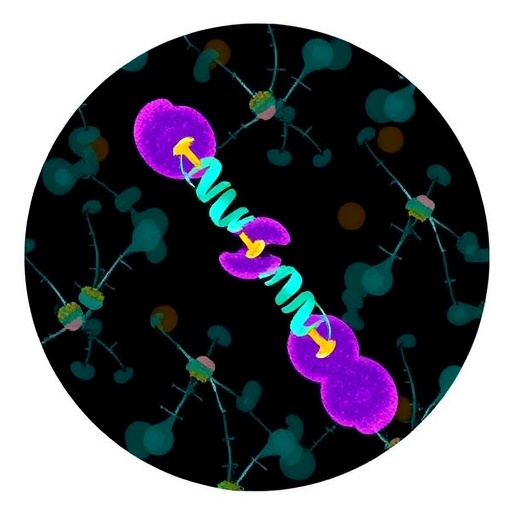In a groundbreaking study published in Science Advances on September 10, 2025, researchers at St. Jude Children’s Research Hospital have unveiled an innovative multidimensional approach to unraveling the complexities of mitochondrial DNA (mtDNA) mutations and their role in cancer progression. This pioneering research tackles one of the long-standing challenges in oncology: understanding how alterations within the mitochondrial genome influence cancer cell behavior, particularly in leukemia. By integrating computational biology, advanced DNA sequencing methodologies, and sophisticated statistical analyses, the team has not only pinpointed the timing of these mitochondrial mutations but also discerned their functional impact on tumor development and therapeutic resistance.
Mitochondria, known primarily for their essential role as the powerhouses of the cell, possess their own DNA distinct from the nuclear genome. Unlike nuclear DNA, each cell contains hundreds to thousands of mitochondrial DNA copies, a feature which has complicated the study of mtDNA mutations. These mutations often occur heteroplasmically, meaning mutated and wild-type mtDNA coexist within the same cell, creating a complex mosaicism. Historically, determining the functional consequences of such heteroplasmic mtDNA mutations in cancer cells has been a daunting task for researchers given their subtle and variable distribution across cell populations.
The team, led by corresponding author Dr. Mondira Kundu and first author Dr. Kelly McCastlain at St. Jude’s Department of Cell & Molecular Biology, employed a suite of cutting-edge technologies to dissect mtDNA mutations at unprecedented resolution. This included bulk whole-genome sequencing, single-cell genomic assays, and the deployment of powerful computational tools capable of interpreting complex multi-omics datasets. Their meticulous analysis revealed that some somatic mtDNA mutations arise early in the oncogenic process, preceding the full transformation of normal cells into malignant leukemic cells. This early occurrence suggests that mtDNA mutations might play an active role in initiating or promoting tumorigenesis, rather than being mere incidental passengers.
One of the most enlightening findings from this study is the non-random selection of mtDNA mutations within cancer cells. Contrary to the traditional view that mitochondrial mutations accumulate passively during tumor evolution, the data indicate that cancer cells can selectively maintain a mixture of wild-type and mutated mtDNA. This heteroplasmic balance appears to generate functional heterogeneity among leukemic cells, potentially equipping them with diverse metabolic profiles and survival advantages that impact disease progression and therapeutic responsiveness.
To further decipher the biological implications of these mitochondrial alterations, the research group utilized the NetBID2 computational platform, a next-generation systems biology tool developed by co-author Dr. Jiyang Yu from the Department of Computational Biology at St. Jude. NetBID2 can extract regulatory network signals from multi-omics data, allowing researchers to associate specific mtDNA mutations with changes in cellular pathways. Their analyses uncovered that certain mitochondrial mutations correlate with dysregulation in pathways mediating resistance to glucocorticoids, a cornerstone therapy in acute lymphoblastic leukemia (ALL). This finding highlights mtDNA mutations as potential contributors to drug resistance, complicating treatment outcomes.
The revelation that mitochondrial genome alterations can influence therapeutic responses marks a paradigm shift in cancer biology, emphasizing mtDNA as a critical layer of genomic complexity in malignancies. The presence of resistant subpopulations with distinct mitochondrial genotypes may underlie relapses in leukemia patients who initially respond to conventional treatments but later experience disease recurrence. Understanding these mechanisms opens avenues for novel interventions aimed at targeting mitochondrial function and heterogeneity.
Dr. Kundu and colleagues’ work also underscores the value of integrating multi-modal data to parse the intricate genotype-phenotype relationships within tumors. The heteroplasmy levels of mtDNA mutations were quantified at the single-cell level, enabling the dissection of clonal architectures and the temporal sequence of mutations during leukemia evolution. This granular approach provides insights into how mitochondrial genetics intertwines with nuclear oncogenic events, shaping the trajectory of cancer progression in a dynamic and heterogeneous manner.
While the current study focuses predominantly on leukemia, the methodologies developed are broadly applicable across diverse cancer types, offering a framework to systematically investigate mitochondrial contributions to tumor biology. The authors advocate for expanding their analyses to include larger patient cohorts with various malignancies to fully delineate the impact of mtDNA mutations across cancer subtypes and stages.
The implications of this research extend beyond cancer, shedding light on mitochondrial dysfunction in human diseases more generally. Given mitochondria’s pivotal roles in energy metabolism, apoptosis, and cellular signaling, the ability to resolve mutation dynamics within these organelles could catalyze advances in understanding metabolic disorders, neurodegeneration, and aging.
In conclusion, the study spearheaded by the team at St. Jude Children’s Research Hospital represents a significant leap forward in mitochondrial oncology. By revealing that somatic mitochondrial DNA mutations, especially those at intermediate heteroplasmy levels, serve as a source of functional diversity among leukemia cells, the research redefines the mitochondrial genome from a static bystander to an active player in cancer biology. The novel integrative approach combining computational and experimental prowess sets a new standard for future investigations into the mitochondrial genome’s role in disease progression and treatment resistance.
The next frontier, as outlined by Dr. Kundu, involves leveraging these insights to develop mitochondrial-targeted therapeutics and incorporating mitochondrial genotyping into precision oncology paradigms. Such strategies could ultimately improve outcomes by overcoming therapy resistance and preventing disease relapse.
Subject of Research: The role and impact of mitochondrial DNA mutations in cancer progression, specifically in leukemia.
Article Title: Somatic mtDNA mutations at intermediate levels of heteroplasmy are a source of functional heterogeneity among primary leukemic cells
News Publication Date: 10-Sep-2025
Web References:
- Article DOI link: http://dx.doi.org/10.1126/sciadv.adt3873
- Kundu Lab: https://www.stjude.org/research/labs/kundu-lab.html
- Yu Lab & NetBID2 tool: https://www.stjude.org/media-resources/news-releases/2023-medicine-science-news/st-jude-tool-gets-more-out-of-multi-omics-data.html
Image Credits: St. Jude Children’s Research Hospital
Keywords: Mitochondrial DNA, somatic mutations, heteroplasmy, leukemia, cancer heterogeneity, therapy resistance, glucocorticoid resistance, single-cell sequencing, computational biology, NetBID2, mitochondrial genomics, acute lymphoblastic leukemia




